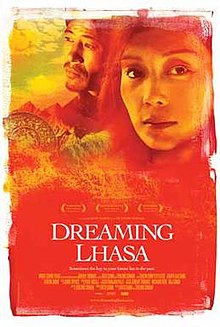
Bhrikuti Devi, known to Tibetans as Bal-mo-bza' Khri-btsun, Bhelsa Tritsun or simply Khri bTsun, was a princess of the Licchavi kingdom in Nepal. In c.622 Bhrikuti became the first wife and queen of the king of Tibet, Songtsen Gampo. Bhrikuti was seen as an incarnation of Green Tara, and is credited for bringing Buddhism to Tibet, together with the Jowo Mikyo Dorje statue for which the Jokhang Temple in Lhasa was built.
Tibetan Americans are Americans of Tibetan ancestry. As of 2020, more than 26,700 Americans are estimated to have Tibetan ancestry. The majority of Tibetan Americans reside in Queens, New York.
Miss Tibet is an annual beauty pageant held in McLeod Ganj, India. It is produced by Lobsang Wangyal Productions.

GyutoTantric University is one of the great monastic institutions of the Gelug Order.

Jetsun Pema is the sister of the 14th Dalai Lama. For 42 years she was the President of the Tibetan Children's Villages (TCV) school system for Tibetan refugee students.

White Crane Films is an independent film production company founded in 1990 in London by filmmakers, Ritu Sarin and Tenzing Sonam. The company produced feature films, documentaries and art installations under its aegis.

The Tibetan Women's Association(TWA) is a women's association based in McLeodGanj, Dharamshala, India. The group was officially formed on 10 September 1984 in India, by Rinchen Khando Choegyal, a former Tibetan Youth Congress activist, although the group itself claims that a precursor was created in Tibet during the 1959 Tibetan Rebellion. Stephanie Roemer traces the organization back to the Lhasa Patriotic Woman's Association, founded in 1953 by the People's Liberation Army, which introduced the idea of women participating in politics, which was "radical" to Tibet.
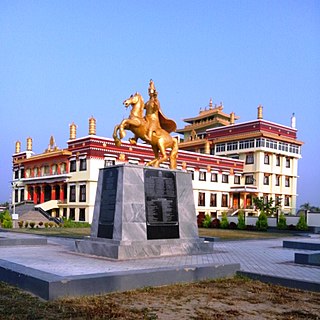
The Tibetan diaspora is the relocation of Tibetan people from Tibet, their country of origin, to other nation states to live as exiles and refugees in communities. The diaspora of Tibetan people began in the early 1950s, peaked after the 1959 Tibetan uprising, and continues.

Lobsang Wangyal is a writer, social activist, photojournalist, and events producer, based in McLeod Ganj, Dharamshala, India. He has been a stringer reporter and photographer for Agence France-Presse for many years.
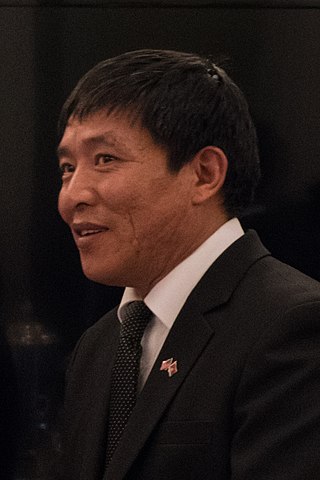
Dhondup Wangchen is a Tibetan filmmaker imprisoned by the Chinese government in 2008 on charges related to his documentary Leaving Fear Behind. Made with senior Tibetan monk Jigme Gyatso, the documentary consists of interviews with ordinary Tibetan people discussing the 14th Dalai Lama, the Chinese government, the 2008 Beijing Olympics, and Han Chinese migrants to the region. After smuggling the tapes of the interviews out of Tibet, however, Dhondup Wangchen and Jigme Gyatso were detained during the 2008 Tibetan unrest.

Ritu Sarin is an Indian film director, producer and artist based in Dharamshala, India. She is the director of the Dharamshala International Film Festival.

Tenzing Sonam is a Tibetan film director, writer and essayist based in Dharamshala. He works through his production company, White Crane Films, which he runs with his partner, Ritu Sarin.

Tashi Tsering also called Tashi Tsering Josayma; born in 1960, is a Tibetan tibetologist, historian and writer.

Tenzin Tsetan Choklay is a Tibetan filmmaker.

Bringing Tibet Home is a 2013 documentary film produced by Tenzing Rigdol and directed by Tibetan filmmaker Tenzin Tsetan Choklay about Tibetan contemporary Artist Tenzing Rigdol's art piece "Our Land Our people". The film premiered at the 2013 Busan International Film Festival in South Korea. This is a Tibetan-language film.
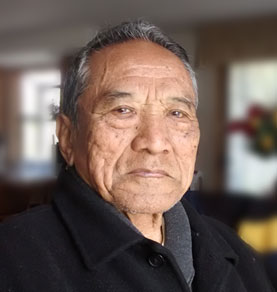
Losang Thonden was a Tibetan government official, scholar, calligrapher, and author.

The Tibet women's football team is a national association football team controlled by the Tibet Women's Soccer (TWS), an organization of exiled Tibetans. Its current team manager is Gompo Dorjee.
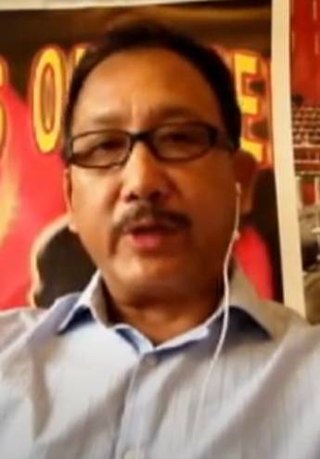
Pema Dhondup Gakyil, who is professionally credited as Pema Dhondup, is a Tibetan film director and actor. He directed and produced We're No Monks (2004) and The Man from Kathmandu (2019), and he provided voiceovers for Tenzin in the Uncharted series of video games. He has resided in Los Angeles, California, since 2004.

Tibet–India relations are said to have begun during the spread of Buddhism to Tibet from India during the 6th century AD. In 1959, the Dalai Lama fled to India after the failed 1959 Tibetan uprising. Since then, Tibetans-in-exile have been given asylum in India, with the Indian government accommodating them into 45 residential settlements across 10 states in the country, creating the Tibetan diaspora. From around 150,000 Tibetan refugees in 2011, the number fell to 85,000 in 2018, according to government data. Many Tibetans are now leaving India to go back to Tibet and other countries such as United States or Germany. The Government of India, soon after India's independence in 1947, treated Tibet as a de facto independent country. However, more recently India's policy on Tibet has been mindful of Chinese sensibilities, and has recognized Tibet as a part of China.
Tibetan Review is a Tibetan monthly journal and news website published in English, based in Delhi, India. It was first published in Darjeeling, West Bengal in April 1967 by Lodi Gyari. It is well known for its open and vibrant democratic forum for the discussion of the Tibetan problem and other related governmental and social issues on Tibet.
